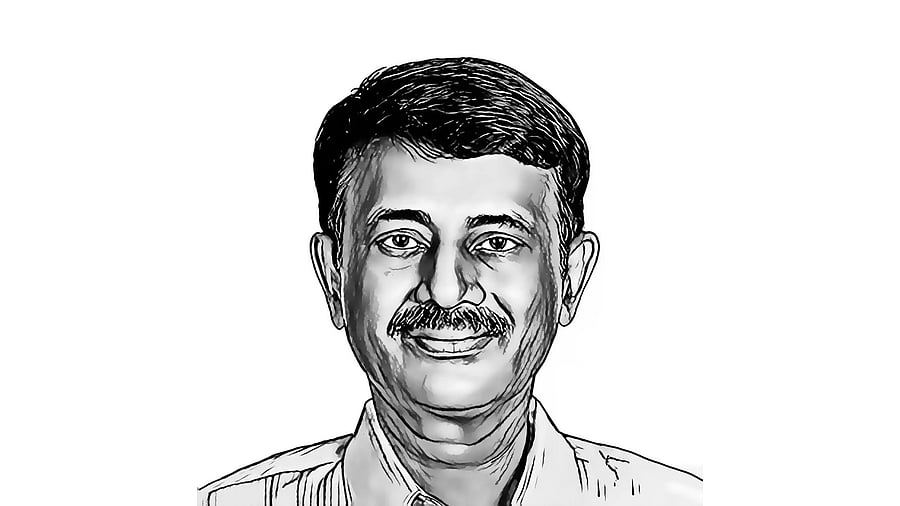
Rajeev Srinivasan is an alumnus of IIT Madras and Stanford. He has taught innovation at IIMs and had stints in Bell Labs and Silicon Valley. He focuses on technology, strategy and foreign affairs.
Credit: DH Illustration
The repeated, withering attacks on the Adani group are getting to be tiresome. Partly because they usually have no merit per se, and partly because the Western habit of weaponising the narrative is now so evident, with the pliant media manufacturing consent to support foreign policy.
In a recent column in the Financial Times, Janan Ganesh wrote: “Politics, not tech, makes the world go around”. He may have a point, but at the moment, it is the opposite: the breakneck GenerativeAI race, and China’s near-monopoly in rare earths, are fuelling both trade wars and capitulation: for example, Trump said “the G2 will be convening shortly”. TACO, anyone?
I said during Biden’s days in “A US-China condominium dividing up the world between themselves”, that for the Deep State, a G2 would be a convenient (short-term) thing to do. Trump apparently has accepted that a) Chinese leverage is insurmountable and b) a division into spheres of influence would work best. Sadly, it would be disastrous for the US (and the Quad) in the medium term to make China Asia’s hegemon.
But it is happening. As BNP Paribas puts it in a research note quoted by the Financial Times, “[Washington]... is now dealing with a peer rival capable of imposing material economic harm on it – a relatively new position for the US and a development which, at least to us, confirms China’s ascendancy to global economic superpower status.”
It would be entirely rational for a G2 to prevent a third great power from rising, and India is the only candidate: Brazil, Russia, South Africa, and the EU are handicapped in one way or the other, e.g., geography, resources, demographics, and politics. Therefore, the G2 are imposing a Thucydides Trap on India: wage economic war, and balkanise it.
Everybody has learned lessons from the recent past (“Confessions of an economic hit-man”, anyone?): how Japan was ruined via the Plaza Accord, how Britain lost its pre-eminence by debasing its currency, and how the US allowed itself to be systematically de-industrialised by China over the last 30 years.
Adani is a proxy for India. Mark Mobius, a legendary investor, said investing in Adani is investing in India. The group has demonstrated the capability to deliver in more than one domain, especially in ports and airports (Disclaimer: I have a small position in Adani Ports). They have operations in Colombo, Haifa (Israel), and Abbot Point (Australia), which makes them a potentially major player in global shipping, not to mention their container ports at Mundra and Vizhinjam (Thiruvananthapuram).
There have been several waves of allegations against the Adani group, the first came in June 2021 over improprieties in investments by Mauritius-based funds; the second in January 2023 with the Hindenburg (a short-seller) report alleging stock manipulation and accounting fraud; the third in November 2024, a US Department of Justice allegation about bribery; the fourth in October 2025 by The Washington Post alleging the Indian government induced LIC to invest $3.9 billion in Adani firms.
When the Hindenburg report was publicised as the “largest con in corporate history” by media such as Reuters, FT, and WSJ, I wrote that “The Adani Group may not be derailed by Hindenburg”. In fact, it was Hindenburg that closed shop.
Adani has been successful in their ports and energy businesses; they are doing well in airports; their efforts in green energy and in data centres (the new Google AI data centre in Visakhapatnam) may yet prove to be winners. Thus, Adani has shown it can compete well in difficult infrastructure sectors. Of course, these need to align with government policies. Which brings whispers of “crony capitalism”, which is rich coming from the US, where “robber barons” like John D Rockefeller, Andrew Carnegie, J P Morgan, and Cornelius Vanderbilt created enormous fortunes primarily through cronyism. Have you heard “What’s good for General Motors is good for America”? Boeing, the Koch Brothers, Goldman Sachs, and Big Tech are current beneficiaries of State munificence.
India has had its share of crony capitalists who provided citizens with shoddy goods at high prices. I don’t dare name them, but you know who they are. Every country supports its national champions: Japan’s zaibatsus, Korea’s chaebols, not to mention China’s State-owned companies. It is neither sinful nor unusual for the State to support dominant, effective players.
The writer is an alumnus of IIT Madras and Stanford. He has taught innovation at IIMs and had stints in Bell Labs and Silicon Valley. He focuses on technology, strategy and foreign affairs.